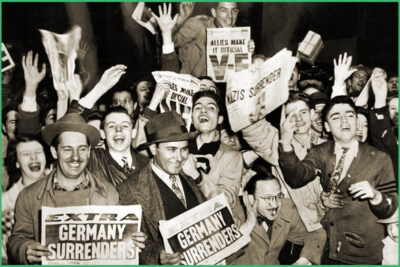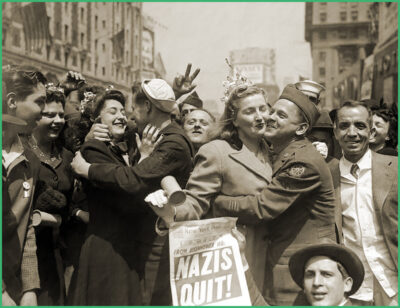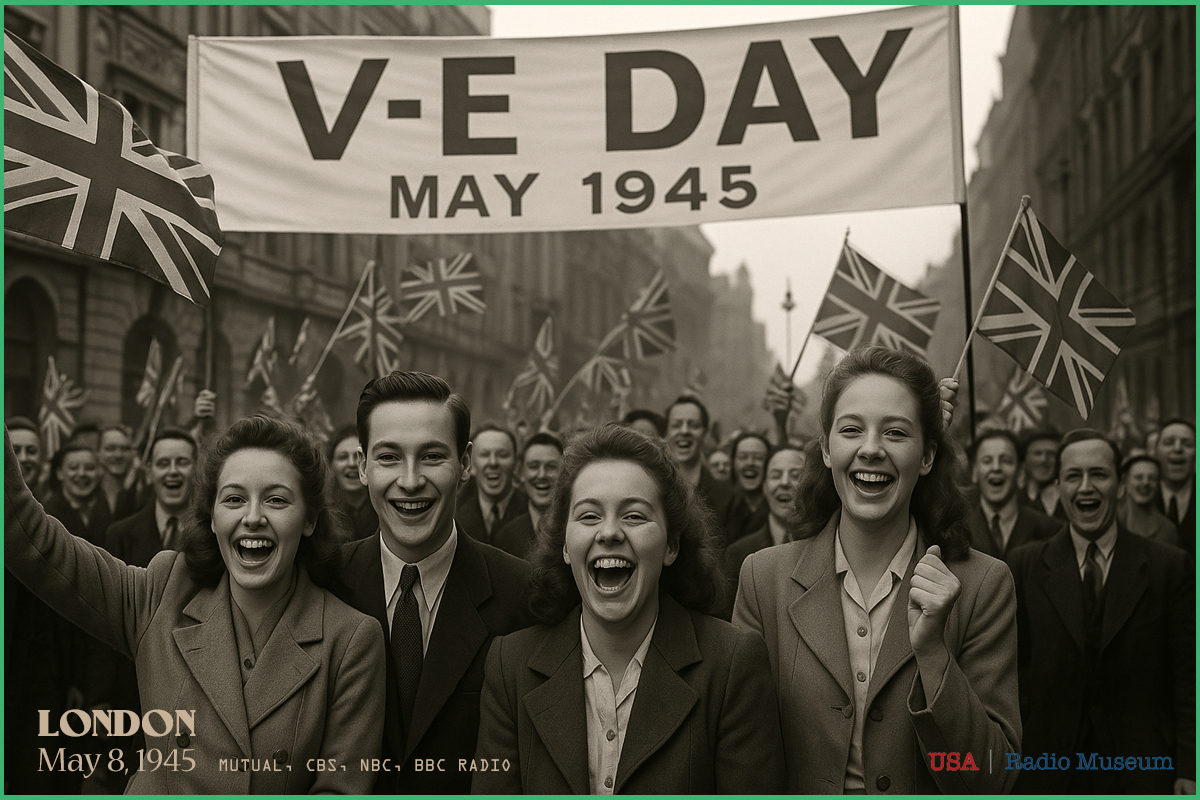Victory in Europe: The End of a Dark Era Through the Voices of Radio On May 8, 1945, the world awoke to a new reality—the war in Europe was fin
Victory in Europe: The End of a Dark Era Through the Voices of Radio
 On May 8, 1945, the world awoke to a new reality—the war in Europe was finally over. After nearly six grueling years, the Allied forces had crushed Nazi Germany, forcing its unconditional surrender. The streets of London, Paris, Moscow, and New York City erupted in celebrations, as people embraced the long-awaited moment of peace.
On May 8, 1945, the world awoke to a new reality—the war in Europe was finally over. After nearly six grueling years, the Allied forces had crushed Nazi Germany, forcing its unconditional surrender. The streets of London, Paris, Moscow, and New York City erupted in celebrations, as people embraced the long-awaited moment of peace.
But for many, the defining experience of that day wasn’t just the sight of rejoicing crowds—it was the sound of victory, carried across the airwaves by radio. NBC, CBS, Mutual Radio, and the BBC became the messengers of history, delivering news bulletins, heartfelt speeches, and emotional reports from the front lines.
Through the crackling static of a war-torn world, listeners tuned in as journalists described Hitler’s demise, Germany’s final surrender, and the eruption of jubilation across Allied nations. Edward R. Murrow’s voice over CBS, steady yet profound, painted the scenes of London as thousands gathered around Buckingham Palace. NBC reported live from General Eisenhower’s headquarters, confirming the moment that would reshape history. Across Britain, the BBC broadcast Winston Churchill’s speech, marking the official end of war in Europe.
BBC Radio | Winston Churchill Announces Unconditional Surrender | May 7, 1945
Audio Digitally Enhanced by USA Radio Museum
For families who had anxiously huddled around their radios for years—waiting for news of battles, invasions, and fallen soldiers—VE Day’s broadcasts were different. They weren’t updates on devastation; they were declarations of victory. And for a world weary from war, radio wasn’t just news—it was hope.
April 1945: The Final Push
- April 1945: The Allies were closing in on Nazi Germany from both the Western and Eastern fronts. The Soviet Red Army was advancing rapidly through Eastern Europe, while American, British, and French forces were pushing in from the West.
- April 30, 1945: Adolf Hitler died by suicide in his bunker in Berlin, leaving Germany in chaos.
- May 2, 1945: Berlin fell to the Soviet Union, marking a decisive moment in the war.
May 1945: Germany’s Surrender
- May 7, 1945: Germany officially surrendered unconditionally to the Allies at General Dwight D. Eisenhower’s headquarters in Reims, France.
- May 8, 1945: The surrender was formally ratified in Berlin, marking the official end of the war in Europe. This day became known as VE Day, celebrated across the world with massive public gatherings, church bells ringing, and national holidays.
VE Day Celebrations
- In London, Winston Churchill addressed the nation, and King George VI appeared on the balcony of Buckingham Palace to greet cheering crowds.
- In New York City, Times Square was packed with 250,000 people celebrating the victory.
- Across Europe, people danced in the streets, lit bonfires, and rejoiced at the end of nearly six years of war.
Radio Networks Covering the War in 1945
During World War II, radio was the primary source of news for millions of Americans. The major networks—NBC, CBS, Mutual, and ABC—had extensive coverage, with correspondents stationed across Europe and the Pacific.
NBC (National Broadcasting Company)
- NBC had around 150 affiliated stations across the U.S. in 1945.
- The network was known for its fast-breaking news coverage, often interrupting regular programming for war updates.
- Max Jordan, an NBC correspondent, was one of the first to report on the surrender negotiations in Geneva.
CBS (Columbia Broadcasting System)
- CBS had 145 affiliated stations in 1945.
- Edward R. Murrow, one of the most famous war correspondents, delivered gripping reports from London and the front lines.
- CBS was known for its in-depth analysis and dramatic storytelling, making war news feel personal and immediate.
Mutual Broadcasting System
- Mutual had the largest number of affiliates, with 384 stations in 1945.
- The network was famous for its live battlefield reports and interviews with soldiers.
- Mutual’s extensive reach made it a key player in delivering war news to rural areas.
ABC (American Broadcasting Company)
- ABC was relatively new, having been formed from the NBC Blue Network in 1943.
- By 1945, ABC had 195 affiliated stations.
- ABC covered war news but was still building its reputation compared to NBC and CBS.
How These Networks Reported VE Day
- NBC and CBS had correspondents stationed in London, Paris, and Berlin, reporting live as celebrations erupted.
- Mutual aired special bulletins and interviews with soldiers and civilians reacting to the surrender.
- BBC broadcast Winston Churchill’s speech and King George VI’s address, marking the official end of the war in Europe.
VE Day—The End of War in Europe Through the Voices of Radio
The Lasting Legacy of VE Day Radio Broadcasts
VE Day was more than just an announcement of victory—it was a moment in time captured through sound, preserved forever by radio broadcasts that carried history’s heartbeat into the homes of millions. Unlike written accounts or still photographs, radio had the unique power to bring people into the moment, letting them hear history as it unfolded—the voices, the cheers, the solemn reflections, and the raw emotions that defined that day.
BBC Radio | BBC Special Newsreel Report | May 5, 1945
Audio Digitally Enhanced by USA Radio Museum
How VE Day’s Broadcasts Remain Historical Treasures Today
Radio coverage of May 8, 1945 remains an invaluable resource for historians, educators, and archivists. The recordings are living documents—audio time capsules that let us experience VE Day just as millions did in 1945. From NBC’s breaking news bulletin announcing Germany’s surrender to Edward R. Murrow’s reflections from London, these broadcasts encapsulate the emotions, relief, and hope felt across the world.
Today, these archives are studied not only for their historical value but for their role in shaping public perception and morale during the war. Scholars analyze the language, tone, and delivery of these broadcasts to understand how news was conveyed, how nations responded, and how radio influenced the collective consciousness in wartime.
NBC Radio | A VE Day Broadcast Special | May 8, 1945
Audio Digitally Enhanced by USA Radio Museum
The Power of Audio Storytelling in Capturing Emotional Moments
Radio’s strength lies in its intimacy—it’s a medium that speaks directly to the listener, creating a personal connection that transcends time. On VE Day, radio transformed into a conduit of emotion, transporting people to the streets of London, Times Square, and Piccadilly Circus, where crowds gathered in celebration.
The power of Murrow’s voice describing the euphoria in London, the clarity of Churchill’s speech broadcast by the BBC, and the gravitas of King George VI’s address gave listeners a sense of presence—they weren’t merely hearing about the victory, they were experiencing it with the world.
Even today, when we listen to these recordings, we don’t just hear history—we feel it. The triumphant tone of broadcasters, the crowds erupting in cheer, and the interviews with soldiers fresh from battle make it one of the most emotionally gripping moments in audio history.
Mutual Radio | Gabriel Heatter VE Day Report | May 8, 1945
Audio Digitally Enhanced by USA Radio Museum
Why VE Day’s Radio Coverage Still Resonates with Listeners and Historians
 More than 80 years later, the impact of VE Day’s broadcasts still lingers. In an era of rapid digital media, these recordings remind us of a time when news was personal, raw, and profoundly human. The voices of broadcasters who announced the surrender of Nazi Germany remain some of the most recognizable and studied in audio history.
More than 80 years later, the impact of VE Day’s broadcasts still lingers. In an era of rapid digital media, these recordings remind us of a time when news was personal, raw, and profoundly human. The voices of broadcasters who announced the surrender of Nazi Germany remain some of the most recognizable and studied in audio history.
Historians turn to VE Day broadcasts not just for facts but for context, emotion, and atmosphere—elements that written records alone can’t fully capture. Museums, archives, and educational institutions continue to preserve these recordings, ensuring that future generations can hear history in its purest form.
For listeners, whether seasoned historians or curious minds, VE Day broadcasts offer an unmatched authenticity—a chance to step into the past and experience the emotions of victory, relief, and remembrance. They remind us that radio was not just a medium for news—it was a lifeline, a storyteller, and a witness to history itself.
Closing Thought: The Sound of Wartime History
Radio allowed millions to experience VE Day in real time, making it one of the most profound moments in the history of broadcasting. As we reflect on its legacy, we recognize not just the power of radio, but its ability to make history unforgettable.
Today, as we listen to those old recordings—the breaking news bulletins, the interviews, the speeches—we are reminded of radio’s unique ability to preserve emotion, carry voices beyond their time, and connect us to history in a way no other medium can.
VE Day’s broadcasts are not just echoes of the past—they are voices that still speak, telling us a story that must never be forgotten.
CBS Radio | Edward R. Murrow | Reporting Celebration in Picadilly Circus, London, U.K. | May 8, 1945
Audio Digitally Enhanced by USA Radio Museum
The Last Echoes of War: How Radio Immortalized VE Day
As the world transitioned from the darkness of war into the dawn of peace, radio remained the bridge between history and humanity. On May 8, 1945, millions sat beside their radios—some in bomb-ravaged homes, others in bustling city streets, and many in quiet solitude—awaiting the voice that would declare the unthinkable: Germany had surrendered, and the war in Europe was finally over.
Through the static and waves of broadcast frequencies, Americans heard NBC’s bulletin confirming the unconditional surrender. Edward R. Murrow’s steady voice over CBS carried the jubilant chaos of London straight into living rooms across the United States. Mutual Broadcasting brought the emotion of small-town celebrations, weaving a tapestry of voices reflecting relief, joy, and remembrance. Across the Atlantic, the BBC delivered Churchill’s words, sealing VE Day in the annals of history with unmatched solemnity and triumph.
CBS Radio | On a Note of Triumph-A Day of Victory | May 13, 1945
Audio Digitally Enhanced by USA Radio Museum
But VE Day was more than an announcement—it was the moment where sound became memory, and memory became legacy. The war was fought on battlefields, in the skies, across vast oceans, but its ending was felt most intimately through the voices that carried its conclusion. It was in the breaking news bulletins, the heartfelt reports, the raw interviews, and the speeches that echoed through radios from New York to Moscow.
Today, as we reflect on that defining chapter in history, these broadcasts remain a living archive, preserving the voices of those who witnessed the day firsthand. For historians, war veterans, and curious minds, the recordings of VE Day are more than just words—they are the heartbeats of history, captured in sound.
And so, we honor radio—not just as a medium, but as a guardian of truth, a messenger of victory, and a storyteller of the past. Because when the world stood still in relief on May 8, 1945, it was the radio that spoke for all of us.
___________________
A USARM Viewing Tip: On your mobile or tablet device? Finger-tap all the above images inside the post and stretch image across your device’s screen for LARGEST digitized view.

